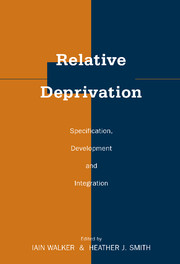Book contents
- Frontmatter
- Contents
- List of Contributors
- 1 Fifty Years of Relative Deprivation Research
- PART ONE SPECIFICATION
- 2 Fraternal Deprivation, Collective Threat, and Racial Resentment: Perspective on White Racism
- 3 Understanding the Nature of Fraternalistic Deprivation: Does Group-based Deprivation Involve Fair Outcomes or Fair Treatment?
- 4 Relative Deprivation and Intergroup Attitudes: South Africa before and after the Transition
- 5 Is It Just Me?: The Different Consequences of Personal and Group Relative Deprivation
- PART TWO DEVELOPMENT
- PART THREE INTEGRATION
- Part Four Conclusion
- Index
4 - Relative Deprivation and Intergroup Attitudes: South Africa before and after the Transition
Published online by Cambridge University Press: 29 September 2009
- Frontmatter
- Contents
- List of Contributors
- 1 Fifty Years of Relative Deprivation Research
- PART ONE SPECIFICATION
- 2 Fraternal Deprivation, Collective Threat, and Racial Resentment: Perspective on White Racism
- 3 Understanding the Nature of Fraternalistic Deprivation: Does Group-based Deprivation Involve Fair Outcomes or Fair Treatment?
- 4 Relative Deprivation and Intergroup Attitudes: South Africa before and after the Transition
- 5 Is It Just Me?: The Different Consequences of Personal and Group Relative Deprivation
- PART TWO DEVELOPMENT
- PART THREE INTEGRATION
- Part Four Conclusion
- Index
Summary
In May 1994, South Africa's first democratic election marked a dramatic transfer of political power from the White minority to the long subjugated Black majority. This provided a unique opportunity to investigate several critical questions about the interaction of sociopolitical change and intergroup relations. In this chapter we report on one such set of questions: how this political transition influenced Africans' perceptions of relative deprivation to Whites, their attitudes to Whites and their ethnic ingroup, and whether changes in relative deprivation causally affected group attitudes, as relative deprivation theorists have long argued.
Prior to the transition in 1994, South Africa was characterized by massive and long standing socioeconomic inequalities between White and Black. From 1917 to 1980, the distribution of personal per capita income showed relatively little change, with Whites earning ten times more than Africans and four to five times more than the Apartheid-designated Asian and Coloured Black minorities. In 1978, South Africa was found to have the most unequal distribution of income of all 57 countries surveyed by the Second Carnegie Commission into Poverty and Development in South Africa, generating a Gini coefficient of no less than .66 (Gini coefficients can vary between 0, where incomes are perfectly evenly distributed, and 1, with most Western countries having coefficients between .20 and .35) (Odén, Ohlson, Davidson, Strand, Lundahl, & Moritz, 1994).
- Type
- Chapter
- Information
- Relative DeprivationSpecification, Development, and Integration, pp. 69 - 90Publisher: Cambridge University PressPrint publication year: 2001



